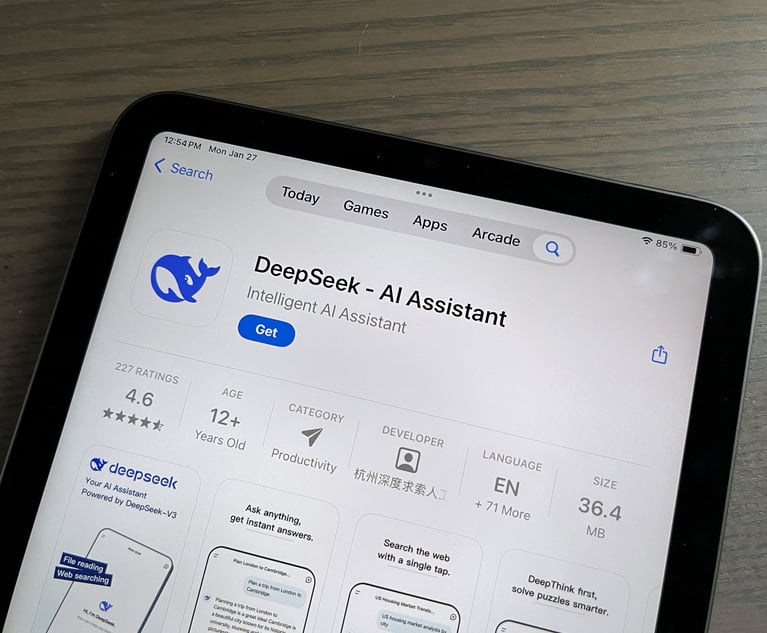Will the Northern District of California's New Settlement Guidance Become the Standard by Which All Class Action Settlements Are Measured?
With little fanfare, the Northern District of California recently issued guidance on class action settlements. The Guidance—by far the most comprehensive in the country—has the potential to have a significant impact, not just on class actions filed in the Northern District of California, but in class actions filed throughout the country.
November 26, 2018 at 06:14 PM
7 minute read
 Michael Mallow and Rachel Straus of Sidley Austin.
Michael Mallow and Rachel Straus of Sidley Austin.
With little fanfare, the Northern District of California recently issued guidance on class action settlements (the “Guidance”). The Guidance—by far the most comprehensive in the country—has the potential to have a significant impact, not just on class actions filed in the Northern District of California, but in class actions filed throughout the country.
An Overview of the Guidance
The Guidance focuses on three key areas: (1) detailed and extensive disclosures at the preliminary approval stage, (2) increased scrutiny of attorneys' fees during the final approval phase, and (3) unparalleled transparency of notice efforts and actual recovery via mandatory post-distribution accounting and judiciary oversight.
Preliminary Approval. The Guidance lists the following twelve categories of information parties must provide to the court to obtain preliminary approval for a class action settlement:
- Settlement fund and allocation plan to class members;
- Any differences between the settlement class and the definition of the class as alleged in the complaint, as well as differences between the original claims in the complaint and the claims to be released in the settlement;
- The process used to select the settlement administrator and anticipated administrative costs;
- Class notice and instructions for opt-outs or objections;
- Attorneys' fees, including lodestar calculation, and incentive awards;
- Cy pres recipients, how the cy pres recipients are related to the subject matter of the lawsuit and the class members, and any relationship the named plaintiffs or their counsel have with the proposed cy pres
Final Approval. Unlike other portions of the Guidance, which are more guidelines than requirements, the Guidance requires class counsel to disclose “detailed lodestar information,” in all fee requests “even if the requested amount is based on a percentage of the settlement fund.” The Guidance also requires incentive awards to be supported by evidence of the proposed awardees' involvement in the case and other justifications for the awards. Motions for final approval should also disclose data on submitted claims, undeliverable class notices, opt-outs and objectors.
Post-Distribution Accounting. Within 21 days after the distribution of the settlement funds and payment of attorneys' fees, the parties should file a Post-Distribution Accounting, containing an “easy-to-read chart,” with the following information:
- Total settlement fund;
- Number of notices sent to class members out of the total number of class members;
- Claims rate (number and percentage of claim forms submitted);
- Opt-outs and objections;
- Average, median, largest, and smallest recovery per claimant;
- Notice and payment methods;
- Number and value of checks not cashed;
- Amounts distributed to each cy pre recipient;
- Administrative costs;
- Attorneys fees and cost, including as a percentage of the settlement fund, and the multiplier.
The Court may choose to hold a hearing after the materials are submitted.
Impact on Class Actions in the Northern District of California
The Guidance is intended to ensure fairness, uniformity, and transparency in class action settlements in the Northern District of California. Whether the changes will ensure fairness is an open question, but transparency and uniformity will certainly result from the Guidance. An additional benefit will be access to previously unavailable data about claims rates and distributions that will facilitate analysis of whether, and to what extent, the public meaningfully benefits from the added costs and burdens associated with class actions.
The Guidance is not without issues. It certainly imposes more work on the parties (especially class counsel) and the courts. The Guidance may also make it more difficult for parties to settle class actions. For example, the increased scrutiny on the differences between the settlement class and the proposed or certified class and differences between the original claims in the complaint and the claims to be released in the settlement, may cause defendants to be overly cautious about settling class actions if they are concerned that the court may limit the scope of their release. It is also unclear what happens to a settlement if the court holds a post-distribution hearing and finds that the distribution is inadequate. This will likely be more of an issue for consumer class actions, rather than securities or employment class actions, since most of the concerns relating to poor claims rates or leftover settlement funds reverting to defendants, involve consumer class actions.
Another possible consequence of the Guidance is that it may perpetuate what has become a recent trend in the Northern District of California—judges using class counsels' lodestar to significantly reduce class counsels' fees when the judges believe that the percentage of settlement method provides a windfall to class counsel. This could lead to overbilling by class counsel or the unnecessary prolonging of cases to increase a lodestar in an attempt to circumvent judges applying a lodestar calculation to reduce their fees.
The disclosure requirements in the Guidance may also have the unintended consequence of making it easier for objectors. For example, under the Guidance, plaintiffs should disclose cy pres recipients and any relationship they or their counsel have with the proposed cy pres recipients. Generally, although cy pres recipients are disclosed in motions for preliminary approval, the only way for objectors to know if there is a conflict is for them to connect the dots through their own online research. Now the information will be publicly available and easily accessible to them.
Impact on Class Action Filings in the Northern District of California and Other California Courts
At least initially, due to the increased work and additional disclosures, the Guidance may lead to a reduction in the number of consumer class actions filed in the Northern District of California. But some class counsel, especially in cases where there will likely be high claims rates, i.e., settlement class members are easily identifiable and direct communication is possible, may prefer to file in the Northern District of California because there will be no surprises about what is expected of them when pursuing a class action settlement.
Because California's laws tend to have a pro-consumer bias, it seems likely that class counsel that would have filed in the Northern District of California prior to the Guidance, may file in the other federal districts in California rather than looking to other jurisdictions.
Impact on Class Action Settlements Throughout the United States
Courts around the country will likely be watching to see how the Guidance impacts class action settlements in the Northern District of California. If successful, some jurisdictions may consider implementing similar guidelines, or at least look to the Guidance when evaluating class action settlements. Although the Guidance is a departure from current practice, the Guidance is consistent with the soon to be enacted amendments to Rule 23 and provides a helpful roadmap for practitioners and the courts to follow when trying to settle a class action under the new Rule 23. This is true regardless of where a case is located.
The Guidance could also have a significant impact on class action procedure throughout the country if the Post-Distribution Accounting information suggests that class actions are not benefiting consumers. This could eventually be the catalyst for an overhaul of the current class action process, especially consumer class actions.
Michael Mallow is a partner in Sidley Austin's Los Angeles office and is the co-leader of the firm's Consumer Class Action Defense practice. Rachel Straus is an associate in the office and focuses her practice on complex commercial litigation. They can be reached at [email protected] and [email protected], respectively.
This content has been archived. It is available through our partners, LexisNexis® and Bloomberg Law.
To view this content, please continue to their sites.
Not a Lexis Subscriber?
Subscribe Now
Not a Bloomberg Law Subscriber?
Subscribe Now
NOT FOR REPRINT
© 2025 ALM Global, LLC, All Rights Reserved. Request academic re-use from www.copyright.com. All other uses, submit a request to [email protected]. For more information visit Asset & Logo Licensing.
You Might Like
View All
Redeveloping Real Estate After Natural Disasters: Challenges, Strategies and Opportunities
6 minute read
The Time Is Now for Employers to Assess Risk of Employees’ Use of DeepSeek
4 minute read
Loopholes, DNA Collection and Tech: Does Your Consent as a User of a Genealogy Website Override Another Person’s Fourth Amendment Right?

Trending Stories
- 1States Accuse Trump of Thwarting Court's Funding Restoration Order
- 2Microsoft Becomes Latest Tech Company to Face Claims of Stealing Marketing Commissions From Influencers
- 3Coral Gables Attorney Busted for Stalking Lawyer
- 4Trump's DOJ Delays Releasing Jan. 6 FBI Agents List Under Consent Order
- 5Securities Report Says That 2024 Settlements Passed a Total of $5.2B
Who Got The Work
J. Brugh Lower of Gibbons has entered an appearance for industrial equipment supplier Devco Corporation in a pending trademark infringement lawsuit. The suit, accusing the defendant of selling knock-off Graco products, was filed Dec. 18 in New Jersey District Court by Rivkin Radler on behalf of Graco Inc. and Graco Minnesota. The case, assigned to U.S. District Judge Zahid N. Quraishi, is 3:24-cv-11294, Graco Inc. et al v. Devco Corporation.
Who Got The Work
Rebecca Maller-Stein and Kent A. Yalowitz of Arnold & Porter Kaye Scholer have entered their appearances for Hanaco Venture Capital and its executives, Lior Prosor and David Frankel, in a pending securities lawsuit. The action, filed on Dec. 24 in New York Southern District Court by Zell, Aron & Co. on behalf of Goldeneye Advisors, accuses the defendants of negligently and fraudulently managing the plaintiff's $1 million investment. The case, assigned to U.S. District Judge Vernon S. Broderick, is 1:24-cv-09918, Goldeneye Advisors, LLC v. Hanaco Venture Capital, Ltd. et al.
Who Got The Work
Attorneys from A&O Shearman has stepped in as defense counsel for Toronto-Dominion Bank and other defendants in a pending securities class action. The suit, filed Dec. 11 in New York Southern District Court by Bleichmar Fonti & Auld, accuses the defendants of concealing the bank's 'pervasive' deficiencies in regards to its compliance with the Bank Secrecy Act and the quality of its anti-money laundering controls. The case, assigned to U.S. District Judge Arun Subramanian, is 1:24-cv-09445, Gonzalez v. The Toronto-Dominion Bank et al.
Who Got The Work
Crown Castle International, a Pennsylvania company providing shared communications infrastructure, has turned to Luke D. Wolf of Gordon Rees Scully Mansukhani to fend off a pending breach-of-contract lawsuit. The court action, filed Nov. 25 in Michigan Eastern District Court by Hooper Hathaway PC on behalf of The Town Residences LLC, accuses Crown Castle of failing to transfer approximately $30,000 in utility payments from T-Mobile in breach of a roof-top lease and assignment agreement. The case, assigned to U.S. District Judge Susan K. Declercq, is 2:24-cv-13131, The Town Residences LLC v. T-Mobile US, Inc. et al.
Who Got The Work
Wilfred P. Coronato and Daniel M. Schwartz of McCarter & English have stepped in as defense counsel to Electrolux Home Products Inc. in a pending product liability lawsuit. The court action, filed Nov. 26 in New York Eastern District Court by Poulos Lopiccolo PC and Nagel Rice LLP on behalf of David Stern, alleges that the defendant's refrigerators’ drawers and shelving repeatedly break and fall apart within months after purchase. The case, assigned to U.S. District Judge Joan M. Azrack, is 2:24-cv-08204, Stern v. Electrolux Home Products, Inc.
Featured Firms
Law Offices of Gary Martin Hays & Associates, P.C.
(470) 294-1674
Law Offices of Mark E. Salomone
(857) 444-6468
Smith & Hassler
(713) 739-1250






